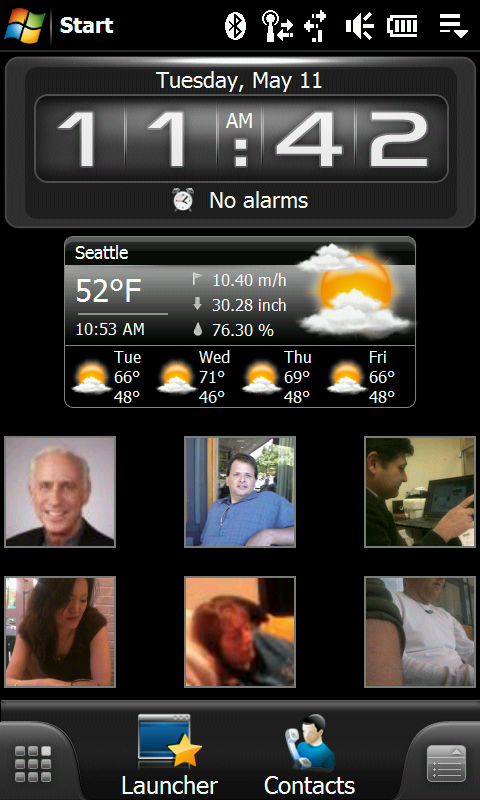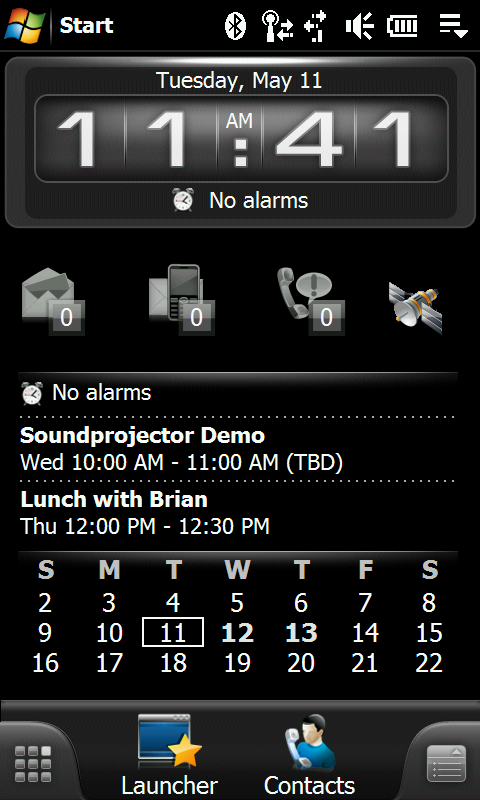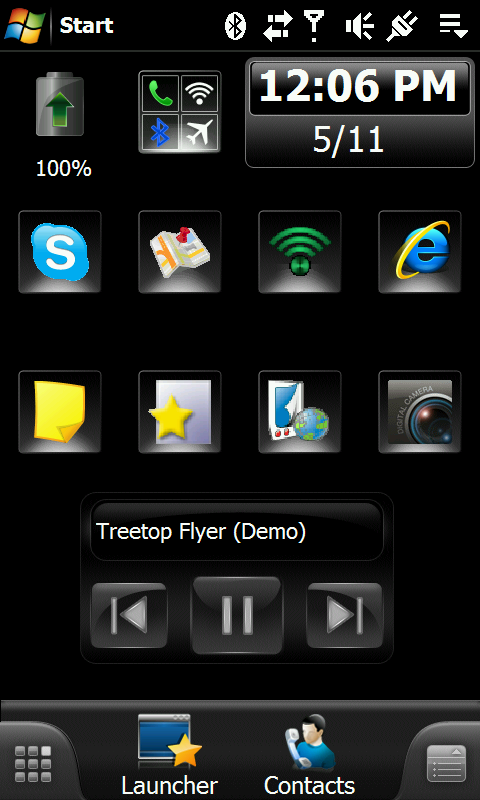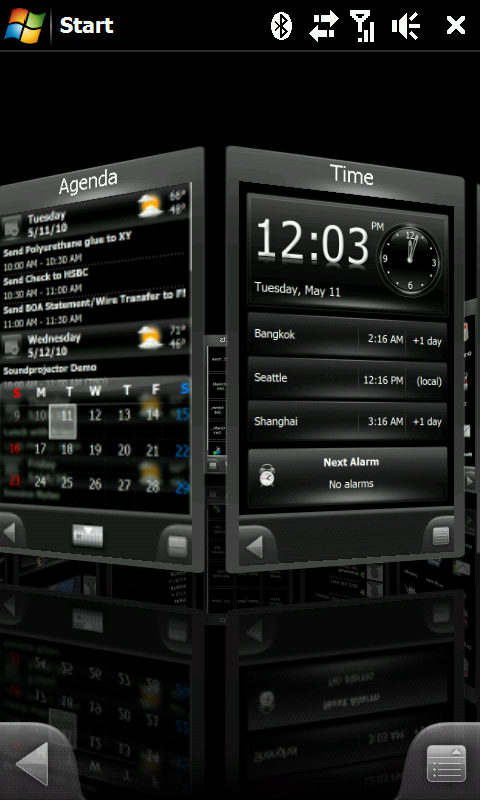Skip to comments.
iOS 4 vs Android 2.2 - Fight: The two leading operating systems go toe to toe
Pocket-Lint ^
| 24 June 2010
| Stuart Miles
Posted on 06/28/2010 9:51:07 AM PDT by PugetSoundSoldier
We've analysed whether the HTC Desire is better than the iPhone 4 but what about the two operating systems that power these leading mobiles? Does iOS 4 from Apple really pack a punch when it comes to smartphone supremacy, or is the real champion Google's Android OS? We look at the key areas of each OS to find out which truly is king of the ring.
...
The functionality, flexibility and fun of Android 2.2 simply leaves iOS 4 in its dust. It might not be as straight forward, it might be easier to throw off kilter, it might not even be quite as smooth running but it keeps you interested in your mobile phone and all the magic it can perform for longer.
(Excerpt) Read more at pocket-lint.com ...
TOPICS: Computers/Internet
KEYWORDS: android; apple; ios4; phones
Navigation: use the links below to view more comments.
first previous 1-20, 21-40, 41-53 next last
To: archivist007
I have a 3GS with iOS4. Several of my apps have gone berserk after the ‘upgrade’. The battery life is an issue now.
When our contract is up, I’m definitely going to look at the Droid.
Its amazing that Apple is repeating the same mistake it made in the 80s when it lost the PC wars. Great product, high price, good customer base, and megalomaniac Steve Jobs trying to control everything.
21
posted on
06/28/2010 10:57:38 AM PDT
by
Azeem
(The world will look up and shout "Save us!"... And I'll whisper "No.")
To: LearnsFromMistakes
22
posted on
06/28/2010 10:57:38 AM PDT
by
PugetSoundSoldier
(Indignation over the Sting of Truth is the defense of the indefensible)
To: PugetSoundSoldier
Sorry, but that’s bunk.
I’ve coded them both, and the conclusion you are proposing is absolutely false.
The most annoying part of iPhone is the fact it uses Objective C as its language while Droid is based in Java.
However the notion you as a user have to work around the phone on an iPhone is just flat out nonsense. There is no more user centric interface on the planet than what Apple has put on the iPhone/iPad/iPod touch. It is truly amazing what they have accomplished in this space.
Droid isn’t remotely on par at any level, to claim its more USER centric is laughable.
Trust me, I’m no Apple lover, my detesting of Apple goes back to the early 80s, but in this space, with these products, they are the leader, period.
To: HamiltonJay
The most annoying part of iPhone is the fact it uses Objective C as its language while Droid is based in Java.What do you think they should use - they not being iOS/Android, but just programmable phones? Is Androids Java RTS (or whatever they are using today to indicate time-critical processing)? I use Java daily, but my world is more EE than 'fun'...
24
posted on
06/28/2010 11:08:14 AM PDT
by
LearnsFromMistakes
(Yes, I am happy to see you. But that IS a gun in my pocket.)
To: HamiltonJay
I’ve coded them both, and the conclusion you are proposing is absolutely false. In your opinion, of course...
However the notion you as a user have to work around the phone on an iPhone is just flat out nonsense. There is no more user centric interface on the planet than what Apple has put on the iPhone/iPad/iPod touch. It is truly amazing what they have accomplished in this space.
Really? I find the iPhone UI incredibly restrictive. I'm limited in what I can put on each page, it must all look the same, it cannot be flowing and adjusted as needed.
For example, consider these screen captures from my WinMo phone (note you can do the same thing with Android):



Those are my 3 "home" pages (I can create as many as I like). Left to right, the default is the middle one. I can set up, drag and drop, resize, recolor, reconfigure each app and icon as I want. Complete control to make the phone interact as I want it to operate.
And of course I can look at all apps and functions as I want, with a really quick scroll-wheel:

I use G-Profile to make my phone operate as I live my life. Profiles will change based upon my appointment status (level of importance), time of date, and even location. I don't have to remember to set my phone a certain way when I go to the local movie theater, or the doctor's office, or church; my phone auto-sets for me based upon when and where I am.
THAT is called having the phone operate around me, not me operate around the phone. You might like the iPhone UI as-is; that's great! And you can set up Android to have the same UI if you prefer. But if you don't like it, you're stuck; with Android (or WinMo) you can change it to what works for you.
25
posted on
06/28/2010 11:20:56 AM PDT
by
PugetSoundSoldier
(Indignation over the Sting of Truth is the defense of the indefensible)
To: PugetSoundSoldier
Apple got knocked out by IBM becuase of thier closed architecture design on thier original P.C.’s. I believe the Android because of their more open architecture will cause the same headache for Apple this around time too.
26
posted on
06/28/2010 11:26:26 AM PDT
by
rwoodward
(Lucas Smith)
To: PugetSoundSoldier
Well, the first problem: There are no phones running Android 2.2 on the market yet.
Also, the political equivalent is pathetic.
To: PugetSoundSoldier
It's a person-centric approach, rather than a phone-centric approach. Funny, this is exactly what Apple brought to the smart phone world with the iPhone. That they've been selling like hotcakes, and that everyone is copying, shows it was a good idea.
To: PugetSoundSoldier
Thanks, but I don’t think this will work for me.
To: PugetSoundSoldier
Note that even your own posted source gives iOS the win for usability and customization.
To: rdb3; Calvinist_Dark_Lord; GodGunsandGuts; CyberCowboy777; Salo; Bobsat; JosephW; ...
31
posted on
06/28/2010 11:50:57 AM PDT
by
ShadowAce
(Linux -- The Ultimate Windows Service Pack)
To: PugetSoundSoldier
In other words, removing malware, much like an OS malware patch would do. And just think, if this had been the iPhone, those apps would have never gotten through to be installed on anybody's phones in the first place.
To: antiRepublicrat
Is there a "Today" screen for the iPhone? To me, that is an important function for a smart phone - the ability to see crucial information at a glance.
For example, consider my Today screen/home page:

The very top (left to right) has my Windows Menu and status bar (showing icons for Bluetooth, Wifi, 3G signal strength, sound settings, battery, and the icon to launch the task manager).
Then it has my large clock.
Then a row of status icons indicating number of e-mails, messages, and missed calls, and my icon to launch my GPS position tracking program.
Then I have my calendar, with the next few appointments listed and a few weeks as well.
Then the carousel launch icon (for the way to scroll through all the pages, quickly with a flick of the screen), my icon to launch a scrollable page of my most recently used applications, an icon to launch my most-recently used contacts, and then an icon to customize the display.
There's a LOT of functionality and status on just that one page. With one click I can return phone calls, read e-mails or texts, check my schedule, etc. And the need to do those is presented in a simple, clean, interface.
That's what I consider a person-centric UI. Yes, it may not be as intuitive out-of-the-box as an iPhone-like UI, but since I created - literally designed - this UI, I know what everything means. I put it where I wanted, and it means I can use it to my needs.
That is what I consider a very important factor for a smartphone. I'm not so concerned about how easy it is for my niece to run, but how easy it is for me to run. And since I set it up, I know how to run it.
33
posted on
06/28/2010 12:17:18 PM PDT
by
PugetSoundSoldier
(Indignation over the Sting of Truth is the defense of the indefensible)
To: LearnsFromMistakes
I work with Java personally more than any language, Objective C is just an obtuse language, that if not for Jobs/Apple keeping it alive would have (and rightly so) died a long time ago.
If you like needlessly verbose languages and having a memory management model that basically was designed by someone on crack, Objective-C is the language for you.
It functions, but it really should be dead, C++ won the object oriented C battle back in the 80s, that this “over way of doing it” is still around is definitely NOT one of Apple’s great achievements.
To: PugetSoundSoldier
And the need to do those is presented in a simple, clean, interface. First, I wouldn't call that simple or clean.
but since I created - literally designed - this UI, I know what everything means. I put it where I wanted, and it means I can use it to my needs.
This is one reason the iPhone is so good. It locks down the UI enough so that anyone picking up any phone can do pretty much anything with little or no training. On the other hand, the built-in ability to do some widgets would be nice. But on my Android they are kind of finicky, which is probably why Apple is waiting for any kind of implementation.
To: HamiltonJay
It functions, but it really should be dead, C++ won the object oriented C battle back in the 80s, that this “over way of doing it” is still around is definitely NOT one of Apple’s great achievements. Objective C seems strange because most of us are used to the Simula way of doing things. Objective C got its object handling from Smalltalk.
Personally, I find C, C++ and Objective C to be awkward and ugly. I like the cleanliness of c#. On the other hand, Apple has done some really cool stuff that you can't get in any other language, such as using Grand Central for your multithreading, etc.
To: antiRepublicrat
First, I wouldn't call that simple or clean. Yeah, personal preference is the key. The thing is, with Android or WinMo you can make the UI clean like you like, or full-featured like I like. Choice is never a bad thing!
It locks down the UI enough so that anyone picking up any phone can do pretty much anything with little or no training.
Sure, but if you ever want to go beyond, you're stuck. I'd much rather have a UI that's simplified by default, but isn't locked so that the user can change it as they want. Even to the point of mixing-and-matching icon sizes, so you can put more apps on a single screen, but leave your most-often-used apps big and spaced apart (easier to locate and select).
It really comes down to what you want to do; with an iPhone you do it the way the Apple UI is designed. You have no choice. With Android or WinMo you can do it however you want - same as an iPhone, or anything else you like.
IMHO, freedom and choice in UI is always a good thing!
37
posted on
06/28/2010 1:18:10 PM PDT
by
PugetSoundSoldier
(Indignation over the Sting of Truth is the defense of the indefensible)
To: PugetSoundSoldier
Yeah, personal preference is the key. There is personal preference, but there are also scientific rules of human-computer interaction.
Choice is never a bad thing!
I can't completely agree with that. While I love hacking and customizing myself, I do know that it's pretty easy to violate the UI laws while doing it.
It really comes down to what you want to do; with an iPhone you do it the way the Apple UI is designed. You have no choice.
And the way it was designed probably included hundreds or thousands of hours of usability testing, as opposed to the amateur changes most people will make, leaving the UI personalized, but far less usable.
To: antiRepublicrat
There is personal preference, but there are also scientific rules of human-computer interaction. When preference and rules collide, preference wins.
For example, how much salt is the right amount of salt on your french fries?
How much blue should be used on your screensaver?
Sure, there are "rules" about it, but in truth, the preference of the consumer - the user - is ALWAYS right. There isn't any "right or wrong" when it comes to what you prefer; there is what you prefer and what you do not.
Now, there are UI guidelines that are generally accepted as just that - guidelines to consider. But slavish devotion to UI paradigms gets you left in the world of old UNIX; the only UI that is correct (by those rules) is the command line. This "gooey crap is flat-out wrong" approach; thankfully Linux and more modern UNIX installs have broken out from that! You can still use your command-line interface, but you have the CHOICE to use a different UI - MANY different UIs!
I can't completely agree with that. While I love hacking and customizing myself, I do know that it's pretty easy to violate the UI laws while doing it.
Then how does innovation happen, if you don't violate the "UI laws" and try something new?
And the way it was designed probably included hundreds or thousands of hours of usability testing, as opposed to the amateur changes most people will make, leaving the UI personalized, but far less usable.
With the iPhone 4 antenna issue, we've seen that a company doesn't always have the best usability testing...;)
And ultimately, my UI is MUCH more usable TO ME. For you, no. So leave it as the default, but I find that incredibly limiting. I have all my most-recent apps and settings (30 - yes, mixed together) on a single scrollable screen, that I can scroll up-and-down with a single flick. I don't have to flick through 3 or 4 screens, just one.
Basically, who knows what is most useful, desirable for me: Apple or me? Who knows what's most useful, desirable for you: me or you?
A "one size fits all" solution is a good starting point, but LOCKING it to that means we'd all drive white mid-size cars, live in a 1700 square foot home on ~0.2 acres, and eat Frosted Flakes and a latte for breakfast.
Which ultimately is why I made the opening comparison; choice IS freedom - the freedom to choose! It is an inherently conservative position - freedom of the individual.
A top-down, rigidly enforced structure - like the iPhone UI - is necessarily anti-choice. It is like the USSR of old - you are given what you get, you are told what you will like, and that's it. Sure, you might like that, but it is categorically opposed to freedom. It is not conservative.
Don't take this as me saying your preference for the Apple iPhone UI means you're a communist or not conservative! On the contrary, what you like is what you like and no one should criticize you for that. However, the lock-down, inflexible approach to the UI is the problem. It does not allow you the freedom to do what you want to do.
39
posted on
06/28/2010 2:12:20 PM PDT
by
PugetSoundSoldier
(Indignation over the Sting of Truth is the defense of the indefensible)
To: PugetSoundSoldier
Sure, there are "rules" about it, but in truth, the preference of the consumer - the user - is ALWAYS right. This reminds me of the old Henry Ford saying, "If I'd asked my customers what they wanted, they'd have said build a better horse." Apple wanted to bring smart phones back into the realm of being consumer electronics devices instead of the overly-complicated computers they were becoming. Being a consumer electronics device means the UI must be fast and simple, and highly intuitive. Do you customize the UI of your TV? Do you customize the UI of your alarm clock? Do you complain that you can't?
Along those lines, the multitasking of Android is also a severe shortcoming. A user should NEVER have to think about what's running in the background and how much that's impacting his battery life. You run a program, go back to the Home screen, that's it, forget about it. Anything more complicated is going back towards complicated computers, away from consumer electronics.
Then how does innovation happen, if you don't violate the "UI laws" and try something new?
There is a lot of innovation in UI design, even staying within the rules. The original iPhone's UI is a good example, OS X is a good example. The task selector of Windows 7 isn't such a good example (Windows is application-based, and OS X is document-based, but Windows took the management metaphor from Apple, so it didn't work).
With the iPhone 4 antenna issue, we've seen that a company doesn't always have the best usability testing
That's more of an engineering issue. Remember, this is the company that even tests the user experience of unboxing its products.
Ultimately, your freedom is in choosing an iPhone or other phone. Whether you want the complications of computers shoehorned into your consumer electronics devices, or whether you just want those devices to work, simply.
Navigation: use the links below to view more comments.
first previous 1-20, 21-40, 41-53 next last
Disclaimer:
Opinions posted on Free Republic are those of the individual
posters and do not necessarily represent the opinion of Free Republic or its
management. All materials posted herein are protected by copyright law and the
exemption for fair use of copyrighted works.
FreeRepublic.com is powered by software copyright 2000-2008 John Robinson




